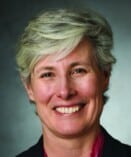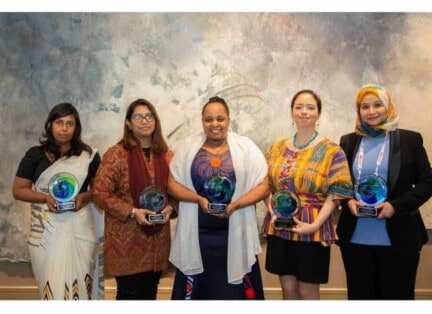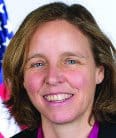NAMED AIAA FELLOW

CREDIT: Penn State
Amy Pritchett, Sc.D., head, department of aerospace engineering, Penn State, was elected a fellow of the American Institute of Aeronautics and Astronautics. AIAA elects about one fellow for each 1,000 professional members each year and recognizes them as “a person of distinction in aeronautics or astronautics” who has had a valuable and notable influence in the field.
Dr. Pritchett received this honor for her significant contributions to the safety of future complex, flight-critical systems. Her research has helped pave the way for early prediction of safety effects and human contributions to safety in aircraft. Her work in the field has contributed to a wide range of technologies used in flight, including in-trail spacing, collision-avoidance systems, human-autonomy teaming in aircraft and spacecraft, and supporting the pilots’ contributions to safety.
She served as director of NASA’s Aviation Safety Program for two years, where she established the research effort that expanded the knowledge of verification and validation of flight-critical systems. She has also dedicated her time to serving in multiple national leadership roles for the AIAA. In 2009, the AIAA digital avionics technical committee named a scholarship after Dr. Pritchett for her service. In 2007, the AIAA also awarded her the Lawrence Sperry Award for her notable contributions as an aerospace engineer under the age of 35.
Dr. Pritchett came to Penn State from the Georgia Institute of Technology in 2017. Since then, she has continued advocating the promotion of diversity and equity in engineering. She has also continued mentoring women in aerospace engineering, including faculty and students, working to create a national network for women in the field.
EARLY CAREER DEVELOPMENT PROGRAM AWARD

CREDIT: Rensselaer Polytechnic Institute
To advance the field of photonic quantum devices, Esther Wertz, Ph.D., assistant professor, physics, applied physics, and astronomy, Rensselaer Polytechnic Institute, was awarded a National Science Foundation Faculty Early Career Development Program (CAREER) award to investigate nanometer-scale metal structures that will control light at the quantum limit, one photon at a time.
Dr. Wertz’s work will contribute to the creation of a single photon transistor. Her research at Rensselaer centers on the study of light-matter interactions at the nanoscale. Her work focuses on investigating the changes in these interactions in the vicinity of small metal nanoparticles using super-resolution microscopy techniques, and on designing materials or structures that interface with light in predetermined ways. Dr. Wertz’s research laboratory will also explore the new quantum properties that emerge when excitons and localized surface plasmon resonances become strongly coupled.
EXCELLENCE IN INNOVATION

CREDIT: University of Maryland
Department of mechanical engineering professor Jelena Srebric, Ph.D., was named recipient of the 2020 University System of Maryland (USM) Board of Regents (BOR) Faculty Award for Excellence in Innovation. The award is the highest honor that the USM BOR bestows in recognition of exemplary faculty achievement. Each year, the USM BOR announces up to 17 awards in five categories: mentoring; public service; research, scholarship, or creative activity; teaching; and innovation.
Dr. Srebric, director of The Center for Sustainability in the Built Environment (CITY@UMD) at the University of Maryland, manages and directly supervises the research activities for approximately $1.5 million annually in externally funded projects. The focus of her research group is on multiscale modeling of built infrastructure to provide a reliable assessment of how these systems affect occupant population, energy consumption, and associated CO2 emissions. These modeling efforts include development of computational tools as well as experimental facilities and sites.
RECOGNIZING WOMEN ENGINEERS IN DEVELOPING COUNTRIES
Five early-career researchers living and working in Bangladesh, Guatemala, Kenya, Sri Lanka, and Yemen have been recognized for their work in engineering, innovation, and technology by the OWSD-Elsevier Foundation Awards for Early-Career Women Scientists in the Developing World. The prize also acknowledges the scientists’ commitments to leading and mentoring young scientists, and to improving lives and livelihoods in their communities and regions.
The five researchers are:
- Susana Arrechea, Ph.D., University of San Carlos of Guatemala, chemical engineering and nanotechnology, for her work on the potential industrial and environmental applications of materials such as nanoparticles, nanotubes, and graphene, which can be employed in creating more sustainable building materials in water treatment, solar devices, and other renewable energy solutions.
- Champika Ellawalla Kankanamge, Ph.D., University of Ruhuna, Sri Lanka, environmental engineering, for her research on aquatic ecosystem conservation and pollution control. Her work contributes to the control of invasive aquatic plants in river ecosystems and the prevention of ecosystem degradation, by restoring shade and encouraging the natural resistance of other native plants in the ecosystem to the invasive species.
- Chao Mbogo, Ph.D., Kenya Methodist University, computer science, for her work designing techniques to support students in resource-constrained environments to learn computer programming using mobile devices. Her research finds ways to circumvent limitations such as small screens and small keypads that make it difficult for students to use mobile phones for programming in areas where computers are not easily available.
- Samia Subrina, Ph.D., Bangladesh University of Engineering and Technology, electronic engineering and nanotechnology, for her research on thermal and electronic transport in nanoscale materials and the applications of these materials in nanoscale devices. Her work has the potential to extend the life spans and reduce degradation in such devices by preventing overheating, and supporting the development of new technologies such as low-power nanoelectronics, high-efficiency solar cells, and thermoelectric power generators.
- Fathiah Zakham, Ph.D., Hodeidah University, Yemen, bioengineering and microbiology, for her work using biotechnology and bioengineering to develop rapid, accurate, and cheap tools for the diagnosis and management of tuberculosis and other emerging infectious diseases.

CREDIT: Alison Bert
APPOINTED TO PRESIDENT’S COUNCIL OF ADVISORS ON SCIENCE AND TECHNOLOGY

CREDIT: Virginia Tech
The White House announced Jan. 28 the president’s intent to appoint Theresa Mayer, Ph.D., executive vice president, research and partnerships, Purdue University, to the U.S. President’s Council of Advisors on Science and Technology (PCAST). The function of PCAST is to advise the president on matters involving science, technology, education, and innovation policy. Its members are leading scientists and engineers.
Dr. Mayer is internationally recognized for her research in applications of nanotechnology to electronic and photonic devices and microsystems. In addition, her work in directed assembly of nanoparticles has been used to address a variety of device and manufacturing challenges, ranging from low-power integrated nanosensor circuits to nontraditional patterning processes.
She previously served as vice president for research and innovation and as a professor of electrical and computer engineering at Virginia Tech University. Prior to those positions, Dr. Mayer was at The Pennsylvania State University for more than 20 years, serving as a distinguished professor of electrical engineering, and associate dean for research and innovation in the College of Engineering. She was site director of the National Science Foundation’s National Nanotechnology Infrastructure Network and director of the Materials Research Institute Nanofabrication Laboratory at Penn State.
NEW MEMBERS INDUCTED INTO DENICE DENTON WOMEN ENGINEERS HALL OF FAME
The Maseeh College of Engineering and Computer Science at Portland State University (PSU) inducted three new members into the Denice Dee Denton Women Engineers Hall of Fame in a ceremony Feb. 13.
Denice Dee Denton, Ph.D., was a professor of electrical engineering; the first female dean of engineering at a major U.S. research university; and chancellor of the University of California, Santa Cruz. Throughout her exemplary career, Dr. Denton served as a role model for women and minorities in science and engineering.
The Maseeh College established the Denton Hall of Fame in 2008 to honor those who have made significant impacts through their dedication to the engineering profession. Inductees demonstrate academic and/or professional excellence, are engaged with their communities, and possess exceptional leadership skills.

CREDIT: Chuck Kennedy
Megan Smith, an award-winning entrepreneur, engineer, and tech advocate, took the Outstanding Female Engineer honors. Smith earned bachelor’s and master’s degrees in mechanical engineering from the Massachusetts Institute of Technology (MIT). After graduating, she worked for several start-ups, including Apple in Tokyo and General Magic, before becoming CEO of PlanetOut, a leading LGBT online community. She joined Google in 2003, serving as vice president of new business development. She transitioned to vice president of Google[x], Google’s advanced products team, leading a wide range of diversity and inclusion initiatives, including co-creating Women Techmakers, a global program that encourages women to pursue and excel in technology careers.
In September 2014, President Obama named Smith the third U.S. chief technology officer in the Office of Science and Technology Policy. In this role, she served as an assistant to the president and focused on how technology policy and innovation can advance the future of the United States.
After leaving the White House in 2017, Smith helped launch the Tech Jobs Tour, which aims to promote diversity in the technological sector. She is currently the CEO of shift7, a company she founded in 2018 that specializes in tech-forward innovation and inclusive collaboration for faster, scaled impact on economic uplift, equity, and inclusion.
Smith has served on the boards of MIT, the MIT Media Lab, MIT Technology Review, and Vital Voices. She has been a member of the U.S. Agency for International Development Advisory Committee on Voluntary Foreign Aid, and an advisor to the Joan Ganz Cooney Center and the Malala Fund, which she co-founded.
2020 OUTSTANDING FEMALE ENGINEERING STUDENTS

Prerna Agarwal is a computer science major and vice president of We in Computer Science (WiCS) at PSU, where she helps organize the annual WiCS hackathon. She is a technical course support specialist in the computer science department and a back-end developer in the PSU Systems and Networking lab. Agarwal received the Outstanding International Student Award in recognition of her leadership, and plans to pursue a master’s degree in systems and networking.

Alexandra Hanson is a computer science major at PSU and a participant in the S-STEM Scholars program, and a student of the Honors College. She works in the Office of Information Technology and is pursuing research opportunities at the Asynchronous Research Center. She coordinates the WiCS Mentorship Program and annual hackathon, with the goal of helping students from underrepresented communities succeed in computer science careers. Hanson plans to pursue doctoral studies next academic year.
This article appears in the 2020 spring issue of SWE Magazine.
Read more from the 2020 spring issue of SWE Magazine:
- Feature: Toward More Accessible Work Environments
- Feature: Engineering for Good
- Feature: Inclusive Design for Living Longer
- Feature: Women Engineers You Should Know
- SWE Forum: From Congressional Visits to the “New Normal” Brought by COVID-19
- Opening Thoughts: Access: A Matter of Human Rights
- News & Advocacy: COVID-19: STEM Strikes Back
- News & Advocacy: Momentum, Authenticity, and Pivoting: The State of Women in Politics
- News & Advocacy: Visiting Congress During a Global Health Crisis
- Career Pathways: Shelter-at-Home Orders Put Spotlight on Disability Accommodations
- President’s Note: Joy and Relevance in the SWE Mission
- Life and Work: Is Sitting the New Smoking?
- Reinvention: From Fixing up My Home to Helping Others Construct Theirs
- Media: Invisible Women: Exposing Data Bias in a World Designed for Men
- Viewpoint: Then and Now: Personal Reflections on Accessibility
- In Memoriam: Marta Kindya, 1946-2019
- Closing Thoughts: Community in Times of Crisis
- Scrapbook: Announcing a New Arrival







